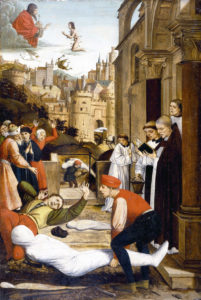
© 2007 James Cridland. Some rights reserved.

© 2007 James Cridland. Some rights reserved.
 Rare it is that I find myself almost 100% onboard for an article at Reason.com, even if it is one of the relatively few right-wing sites I think is worth my time. But Elizabeth Nolan Brown, Reason.com, 40 Ways Things Are Getting Better hits it out of the park, even if I have a few quibbles, notably…
Rare it is that I find myself almost 100% onboard for an article at Reason.com, even if it is one of the relatively few right-wing sites I think is worth my time. But Elizabeth Nolan Brown, Reason.com, 40 Ways Things Are Getting Better hits it out of the park, even if I have a few quibbles, notably…
1. Home entertainment. OK, I would sure have this on the list…but #1?
…
5. Information access I’d have been tempted to put the Internet #1. The quality of elite medical care [distributed on their #13 (AIDS care) #15 (mental health treatment), #23 (cancer care)] would be the other contender.
8. Attitudes toward LGBTQ people and their treatment under the law. Top five for me.
And I’d put a lot of tech–phones, computers, cameras. Machine Learning in my top ten too.
Musical accompaniment here is either Ian Dury or The Beatles depending on your proclivities,
For a good time, see David Froomkin and Ian Shapiro, The New Authoritarianism in Public Choice (July 10, 2021).
Abstract
Much early public choice theory focused on alleged pathologies of democratic legislatures, portraying them as irrational, manipulable, or subject to capture. Recent years have seen the emergence of a new strand of argument, reaffirming the old skepticism of legislatures but suggesting that transferring power from legislatures to chief executives offers a solution. Just as the earlier prescriptions ignored the pathologies of the agencies empowered to check and constrain legislatures, so the new scholarship overlooks the pathologies of executive power. The primary sources of congressional dysfunction call for reforms that would strengthen Congress instead of hobbling it in new ways that exacerbate the drift toward authoritarian presidentialism in the American system. Executive aggrandizement is a consequence of decades of institutional malfunction, worsened by right-wing attacks on legislative capacity. This has been the enduring impact of the public choice movement since the 1950s, but its twenty-first century offshoot is especially malign.
Note: I am not related to Ian Shapiro.

This painting by French artist Josse Lieferinxe depicts an intercession by St. Sebastian during an outbreak of the plague.
For a good time, see Ada Palmer, Ex Urbe, Black Death, COVID, and Why We Keep Telling the Myth of a Renaissance Golden Age and Bad Middle Ages. Warning: It’s kinda long by web standards, but well worth the read.
It begins:
“If the Black Death caused the Renaissance, will COVID also create a golden age?”
Versions of this question have been going around as people, trying to understand the present crisis, reach for history’s most famous pandemic. Using history to understand our present is a great impulse, but it means some of the false myths we tell about the Black Death and Renaissance are doing new damage, one of the most problematic in my view being the idea that sitting back and letting COVID kill will somehow by itself naturally make the economy turn around and enter a period of growth and rising wages.
I’m proud to be part of the editorial board committee of the brand new Journal of Technology and Regulation (TechReg), housed at the Tilburg Institute for Law, Technology, and Society (TILT) at Tilburg University in the Netherlands.
Technology and Regulation (TechReg) is an international journal of law, technology and society, with an interdisciplinary identity. TechReg provides an online platform for disseminating original research on the legal and regulatory challenges posed by existing and emerging technologies (and their applications) including, but by no means limited to, the Internet and digital technology, artificial intelligence and machine learning, robotics, neurotechnology, nanotechnology, biotechnology, energy and climate change technology, and health and food technology. We conceive of regulation broadly to encompass ways of dealing with, ordering and understanding technologies and their consequences, such as through legal regulation, competition, social norms and standards, and technology design (or in Lessig’s terms: law, market, norms and architecture).
We aim to address critical and sometimes controversial questions such as:
- How do new technologies shape society both positively and negatively?
- Should technology development be steered towards societal goals, and if so, which goals and how?
- What are the benefits and dangers of regulating human behavior through technology?
- What is the most appropriate response to technological innovation, in general or in particular cases?
It is in this sense that TechReg is intrinsically interdisciplinary: we believe that legal and regulatory debates on technology are inextricable from societal, political and economic concerns, and that therefore technology regulation requires a multidisciplinary, integrated approach. Through a combination of monodisciplinary, multidisciplinary and interdisciplinary articles, the journal aims to contribute to an integrated vision of law, technology and society.
We invite original, well-researched and methodologically rigorous submissions from academics and practitioners, including policy makers, on a wide range of research areas such as privacy and data protection, security, surveillance, cybercrime, intellectual property, innovation, competition, governance, risk, ethics, media and data studies, and others.
TechReg is double-blind peer-reviewed and completely open access for both authors and readers. TechReg does not charge article processing fees.
…make it Getting Out (the print title; online it’s the much wordier, “Could an Ex-Convict Become an Attorney? I Intended to Find Out”) by poet, father, Yale Law grad (and ex-con), Reginald Dwayne Betts.